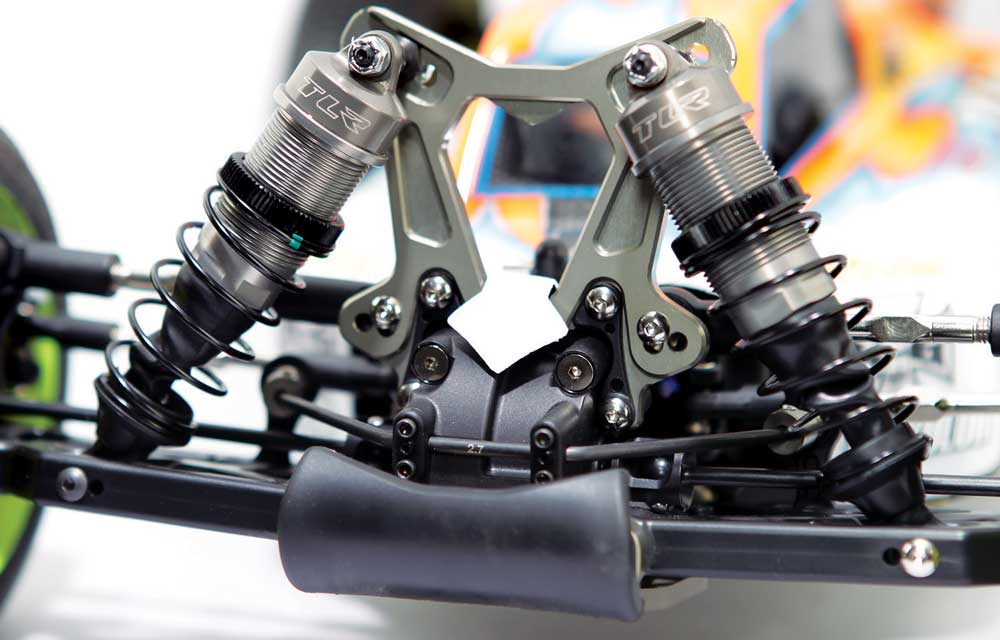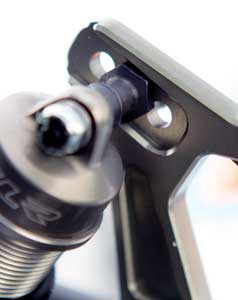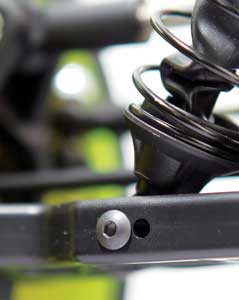Change Your Angle of Attack to Reach the Podium!

Words: Carl Hyndman
Okay, we all know suspension is a key component in making our vehicles perform, but it’s probably one of the most overwhelming areas we are confronted with. One specific area is the effect of where the shocks are mounted. For simplicity, we are going to limit this article to vehicles with shocks mounted on the shock tower and a-arms in an “upright” style (pan cars and vehicles with inboard suspension or other unusual configuration are going to be skipped for now).

If you look at your vehicle, you will notice numerous holes on the shock towers and the suspension arms for the vehicle’s shocks. Those spots can look a bit like Swiss cheese, but what do these different locations do? In a nutshell, these options give the vehicle different handling characteristics. Well that explanation helps only marginally, but don’t get frustrated yet. Keep in mind that as you move the shocks around, your droop could be affected. However, in order to explain things simply, we will break it down in to two areas; the top and bottom mount locations. Also, take note on this simple explanation; the closer you move the shock to the center of the car, the more the suspension arm and tower can put leverage on the spring. Think of a nutcracker. When you move the nut further in, you’ve probably noticed that you need less force to crack that nut. It’s basic physics and also applies to your vehicle’s affect on the spring. Now that you know, let’s take a look at a slightly more detailed explanation. Read on.
ADJUSTING THE PLACEMENT ON THE ARM
On a lot of vehicles, there are usually only a couple of options to mount on the suspension arm. By moving the shock inward on the arm, you are creating more leverage and making the spring feel softer. The opposite is true when moving it out. Keep in mind, by moving it out on the arm, the shock may need to be longer to reach the same point or the droop will be affected. This affects both the shock stroke and droop depending on which one you decide to compensate and fix with. You’ll also have to keep an eye out for the ride height.

ADJUSTING AT THE SHOCK TOWER
Moving the shock location on the tower causes a more subtle change. By moving the top, you are changing the angle of the shock absorber. This mainly affects how progressive the suspension is. Progressive means that as the spring is compressed, it will get dramatically stiff as it goes through its stroke, instead of a more linear rate. By moving the shock inward, you are making the spring action more progressive. This is useful when landing jumps, in high-speed corners, etc. In effect, it is usually more forgiving. By standing the shocks up (moving them out), the car becomes more reactive and is used in tight, quick change of direction layouts.
WRAP UP
Now, that’s not so hard is it? Just remember to make one change at a time to limit your variables and see a direct change before and after. Is your car easier or harder to drive? Does it equate to faster lap times consistently? Also, this is just one item and it needs to work with droop, oil and pistons, springs, shock length, other suspension components, etc. As you can see, it’s not that simple, but hopefully you have a basic understanding to apply to your entire vehicle’s set up. Take your time and record your findings. Good luck and shave some time.
 RC Driver The Best In RC Car & Truck News, Reviews & Video
RC Driver The Best In RC Car & Truck News, Reviews & Video 







